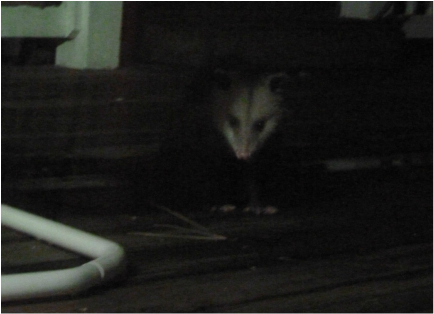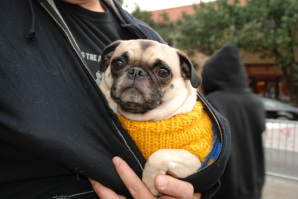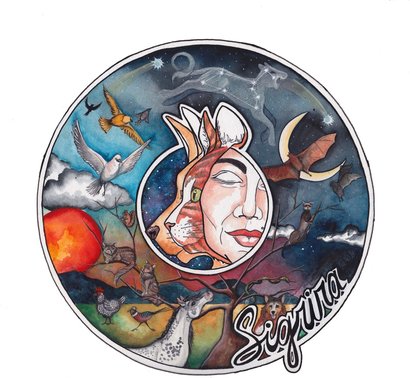|
During these cold winter days, I have been posting reminders about making sure bird baths don’t freeze (or thawing them if they do) so that wild life in the garden can have access to much needed water. Almost everyone loves having birds in the garden & the cuteness of chipmunks. Not everyone appreciates the incredibly beneficial and misunderstood Opossum. Opossums, more commonly referred to as Possums, are sadly considered to be “pests” by many. The first time I saw a Possum in real life was shortly after we moved into our house. I heard a noise outside and I saw this incredibly beautiful creature standing on his hind legs eating from a bird feeder I had recently installed. It was a full moon and his fur looked silvery white, it was almost glowing. He looked like an angel to me. After this lovely sighting, I did research and discovered that they are marsupials, they are crucial to maintaining balance in the garden and, contrary to public opinion, they have a very high resistance to rabies, and rarely, almost never get infected. (All this information & more is readily available online posted by reputable wildlife/animal welfare organizations.) No one seems to know exactly why they rarely get rabies, the Humane Society of the United States posts on their website: “People often mistake the open-mouth hissing and drooling behavior of opossums as a sign of rabies. However, this is just a bluffing behavior that opossums use as a defense mechanism and does not indicate a sick animal. In fact, rabies is extremely rare in opossums, perhaps because they have a lower body temperature than other warm-blooded animals.” (http://www.humanesociety.org/animals/opossums/tips/solving_problems_opossums.html) Possums do not seek out confrontation, instead choosing to “play dead” if threatened. If they somehow end up in the garage you can lure them out with food, ideally fresh fruit. Do not push them with a broom, this will scare them. Possums are sweet, peaceful animals who are simply trying to survive in a very hostile environment. Humans are their greatest threat, and they are often killed in the name of “pest control.” An important part of taking care of our earth starts with how we treat our back yards (or front yard-any land we are responsible for.) All the creatures living on our land are interconnected and crucial pieces of a larger “web.” Possums eat insects & slugs, moles (who also are considered “pests”) aerate the soil to keep it healthy, bees pollinate, etc. I believe anytime there is a “sighting” of wildlife it is a gift. I take it as a moment to appreciate that I share our garden with these beautiful beings and welcome the opportunity to help them out by providing fresh water. I want to share one other possum sighting that I will always remember. It occurred a few years ago in the middle of the night. I heard very loud sounds on the deck, almost like a person stomping. I woke up my poor husband thinking we had an intruder. When we turned on the light, there was a frightened baby possum running around on the deck, searching for his family. My husband returned to sleep and I sat there by the glass door watching with Juneau, both of us enthralled, for a very long time, to make sure the possum would be ok. At one point she yawned and it was so adorable! Eventually a sibling came to get her and they went to find their mom under the deck. Juneau crossed over later that year and I am grateful to have this memory of us having shared this moonlight baby possum sighting experience.  Photo is a little bit dark, (I didn't want to frighten her with flash) but this is the baby possum Juneau and I watched that night.  Happy New Year! As we begin this new year, many of us make resolutions and set intentions for positive changes, big & small. I continue to envision a future where we transcend species and see animals as equals through love, and one seemingly small change that keeps coming to my mind has to do with language. Words hold energy and our language includes the outdated use of referring to animals as “it.” This implies non-sentience and equates them to property. A very simple change (if you don’t already do this) is to never refer to an animal as an “it.” Use “he” “she” “they” or their name/species if unsure. Even if incorrect, “he” or “she” is better than “it.” When talking with our companion animals, consider the language you use with them. Sure, they may not appear to care if they are referred to as “dumb” “jerk” or other negative words, I’ve heard this often said in loving & affectionate tones. Again words carry their own energy, and remember, animals truly do understand everything we say. How would it feel if your parent/loved one called you “dumb? “ even if they said it sweetly & then hugged you? I’ve heard many loving parents of animals say that their fur kid is not especially bright. This is unfair because it is a judgement based on human standards of intelligence. If you asked a human infant (or adult) to track someone through the woods based on scent it is unlikely they would succeed. I also have observed how a kitty glows happily when her parents call her beautiful and some dogs appear to literally smile when their human companions brag about how smart or sweet they are! I know a cat that likes to be complimented on how fast he runs! These changes may seem small or insignificant at first, but they can make a lovely difference for our companion animals and eventually for all animals as we move towards language that defines them as equal to us & as the sentient beings that we all are. |
Archives
January 2021
|
|
|
©2013-2025 Sigrira, LLC,

 RSS Feed
RSS Feed